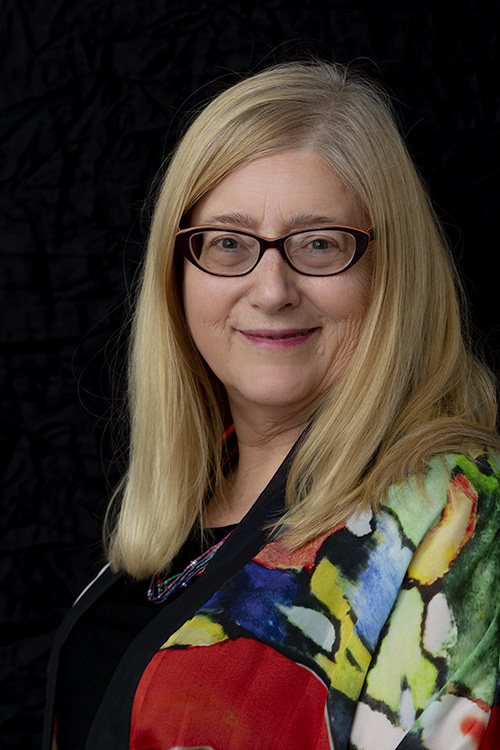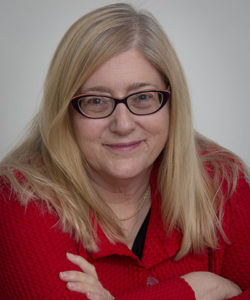A woman in a longstanding lesbian marriage once told me, “I love it that my everyday life is a revolutionary act.” I remembered that while reading the new novel, Fishwives, whose main characters go about their daily lives exemplifying for their friends and neighbors the lasting and perfectly imperfect love of two women. In the process, they model that love for us readers too.
Sally Bellerose writes powerfully about sex and about growing old. She is an accomplished novelist whose work has won her multiple awards.
In her latest novel, Bellerose traces the lives of a Lesbian couple and their friends from their twenties during World War II all the way to the end of their lives in the present day. The book explores how social attitudes affect their romantic and sexual lives, how they cope and push back, and how their love changes and grows, with a depth and compassion that leave us longing for their company after the story is over. We caught up with Sally for an interview about her new book.
STELLA: The main characters in Fishwives, Jackie and Regina, meet in a bar that is raided by the police. Later in the story, younger queer characters meet more organically, in the neighborhood or at college. Was that part of your message about how opportunities have, in some ways, opened up over time?
SALLY: In 1955, when Jackie and Regina got together, it was not only hard to meet other lesbians, it was dangerous. Homosexuality was illegal. Queers, ‘perverts,’ anyone who did not present as cisgender, could be hauled off to jail simply for dressing in the ‘opposite’ gender’s clothing. Decriminalization of same-sex sexual intercourse occurred as late as 2003 in some places in the US. The act of going to a bar that catered to queers was risky. But these bars were one of the few places people could find others like themselves. Even in the 1970’s, “women’s bars,” the euphemism of the day, were one of the prime places lesbians could go to meet other lesbians. I portray this in Fishwives and in my first novel, The Girls Club. I don’t drink, yet bars are featured in both my novels. I seem to have an affinity for dark, sexy, forbidden places.
No doubt opportunities for queers to meet has opened up in most places in the US. The laws have become less discriminatory. The pandemic has surely slowed down even the energetic young. Backlash to gay liberation has been fierce in some quarters during the last eight years. Still the genie of human liberation has been let out of the bottle and there are many who will fight to keep her free.
STELLA: Indeed, there are. Sharing the full scope of Jackie and Regina’s lives allows you to explore how being queer affects their financial stability, which in turn affects their relationship. You talk about the choices they make in a gritty and realistic way. How did you grow these characters?
SALLY: When I write, I’m never sure if I’m trying to grow the characters, the readers, myself, or just portray life as I find it. I wanted to show characters maintaining their working-class sensibility, living in a working-class neighborhood; to show that lives lived in struggle are honorable, worthwhile lives. I wanted to show that sometimes the compromises of upward mobility can be too great. Either of these women could have elevated their socioeconomic status by doing what was expected of them and living a ‘straight’ life. These women had to make it a priority to remain true to what they knew to be their sexual orientation and their attraction to each other, despite what society and the times demanded. On top of that, they were both females who had to support themselves when only low paying jobs were available to women.
STELLA: Several times the main characters wonder how they are supposed to build a life together when the society around them doesn’t even want them to be together. You don’t overtly tie this to the fight for marriage equality, but was that on your mind while you wrote?
SALLY: I cried for joy when I heard the Supreme Court ruling in favor of same sex marriage. Then I got nervous. It’s complicated, but the institution of marriage, especially the part where the state gets involved in our relationships, has little appeal for me. I imposed that belief on the character Jackie without making it an overt part of Fishwives. I understand, in order to be elevated to full citizenship, queers must have the same rights under the law as any other citizen. I worked for marriage equality as did Jackie. I also know that relationships are always in negotiation and the State’s track record negotiating with disenfranchised people causes me anxiety.
STELLA: The push and pull between Regina and Jackie about monogamy versus what we would now call polyamory is key to the story. It’s personal to them, but part of a bigger picture. How do you see this playing out differently in lesbian relationships than in heterosexual relationships — or is it different at all? (Also thank you for writing about their sex lives at all ages!)
SALLY: Early on, Jackie, the butch character, thought there was a silver lining to being closeted. The silver lining was that lesbians (more likely referred to as dykes or queers in the 50s) were rarely coupled in permanent monogamous relationships. This pushed against her femme lover Regina’s strong desire for a one-and-only, till-death-do-us-part union. The socialization of girls and boys played a role in funneling people of all sexual orientations toward monogamy. Below is dialogue between the two, the aftermath of a fight over Jackie’s ‘cheating’.
Regina uncaps the thermos and pours coffee in the aluminum cup. “You’ve never been close friends with a girl, a girly girl. I mean only friends, have you?” Regina’s been pondering the question for some time and has come up with her own answer. “It’s how we’re all brought up, boys and girls, isn’t it? We’re supposed to stop being friends with the opposite sex once we hit puberty. We get interested sexually and we’re expected to couple with one of them and stop being friends with the rest. But what if you’re homosexual? Who are your friends supposed to be?” “Not supposed to be a dyke,” Jackie answers.
I’m not suggesting that butch/femme relationships create a dynamic for any specific interactions in relationships. Jackie happens to be a butch woman who desires what we in 2021 would call an open relationship. In my experience, this was not particularly true of butch women. Nor, am I suggesting that, in any era, butch/femme is the only way lesbians partner. I am suggesting that the ways boys and girls were socialized to act toward each other carried on into adulthood creating taboos and confusion regarding close ‘male/female’ relationships. [My thoughts on this topic]
STELLA: The nexus of racism and homophobia is central to your story. In one scene Regina and her friend Yvonne talk about the gradations of challenge women in their circle face depending on whether they are butch or femme, black or white. How has this changed – if indeed it has – over the time period covered by the book?
SALLY: Jackie and Regina are white women with close friends who are black women. The kids in the neighborhood are Puerto Rican Americans. I am a white writer and a lesbian. For me, as a writer in 2021, ever evolving information from other writers about homophobia and racism is available to draw on. As a white woman, I worry about cultural appropriation, stereotyping, disrespecting, getting it wrong. Writing any character requires consideration, and characters not of my own culture more so. Worrying is less helpful than researching, reading, trying to get closer to right. Leaving characters out of a story because I’m worried is wrong.
The Black Lives Movement was started by three Black women, Alicia Garza, Patrisse Cullors, and Opal Tometi. Two of these women identify as queer. Black Lives has shown us ways to examine our participation in racism, homophobia, and by extension our involvement in all the other isms: ableism, sexism, cissexism, classism, etc. If you asked me ten years ago, I might have said homophobia and racism are waning. In 2021, I am not sure. I am sure there is a lot to learn.
STELLA: Writing workshops always advise authors not to “head-hop,” meaning changing points of view repeatedly during a scene. Yet one of the joys of reading your work is how you switch back and forth between Regina and Jackie, especially in scenes when they are having a dispute and refusing to talk with one another. It’s like listening in on the conversation they wish they were having. How did you develop this skill and the courage to ignore the advice of writing gurus?
SALLY: Thank you. I wrestled with head-hopping in Fishwives before I landed on a version that seems to work. All praise to members of my writing groups who helped me become more judicious in how and when to switch points of view. Stepping back from the story helps to see whether changing viewpoints reads as interiority or just muddled point of view. I’m a retired RN and was a decade into writing (horrible stuff) before the writing gurus got to me.
STELLA: I’m not surprised to hear you were in medicine. Your writing about health issues rings very true. And then at the end of the story, your main characters talk with one another at the edge of death. What are your thoughts about forgiveness and the wisdom of the old, and what do you want us to take away from your novel?
SALLY: Emma Goldman said, “Before we can forgive one another, we have to understand one another.” For me, forgiveness is not about forgetting. It’s about knowledge, sometimes stepping toward or away, or some other form of letting go, and loving anyway.
Thanks for your great blog and these great questions, Stella. And for the opportunity to share my thoughts with you and your readers.
STELLA: And thank you, Sally Bellerose, for your terrific new novel and the chance to talk about it!
Each of us makes decisions in our daily life that improve the lot of our friends, neighbors and society in general. I do believe that everyday life is a revolutionary act – if we choose to live that way.



2 Responses
Impressive again, my friend. I deeply appreciate the scope of your blogs and your reachout to amazing people!
Thank you, Judith! Much appreciated.
All the best,
Stella